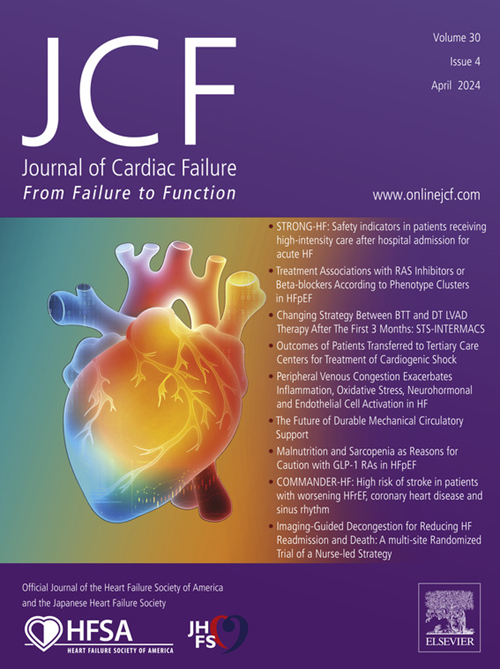临床医生对心力衰竭患者非住院姑息治疗的有效成分、服务特点和实施策略的见解:定性分析。
IF 6.7
2区 医学
Q1 CARDIAC & CARDIOVASCULAR SYSTEMS
引用次数: 0
摘要
目的从专科姑息关怀(SPC)和心脏病学临床医生的角度,了解为心力衰竭(HF)患者提供成功的非住院姑息关怀的必要组成部分、实施特点和实施策略:背景:姑息治疗是心力衰竭患者指导性治疗的推荐组成部分。背景:姑息治疗是指南推荐的心力衰竭患者指导性治疗的组成部分,但在非住院环境中实施姑息治疗的最佳策略尚不清楚:我们对退伍军人事务医疗中心(VAMC)的姑息治疗和心脏病学临床医生进行了半结构化访谈,这些中心是退伍军人事务医疗中心(VAMC),从 2021 年到 2022 年,退伍军人事务医疗中心系统内为高血压患者提供的非住院姑息治疗咨询数量最多。临床医生被问及他们是如何提供门诊 SPC 的,以及他们认为提供护理服务的必要组成部分、服务特点和实施策略是什么。访谈采用定向内容分析法进行分析:我们采访了全国七家退伍军人医疗中心的 14 名 SPC 临床医生和 9 名心脏病临床医生;其中 43% 是医生,48% 是高级执业注册护士/医生助理。门诊 SPC 的基本内容包括讨论护理目标(如预后、预嘱)以及将患者/护理人员与资源(如家庭护理)联系起来。首选的服务特征包括提供 SPC 的综合(即嵌入式)方法、标准化的患者选择和转诊程序,以及 SPC 的正式交接程序。实施SPC的策略包括部署姑息治疗倡导者、向非SPC临床医生宣传门诊SPC对HF患者的价值,以及通过领导支持发展门诊模式:通过优先考虑SPC服务中这些相互重视且必要的特征,可促进在心房颤动患者中更广泛地采用门诊SPC。本文章由计算机程序翻译,如有差异,请以英文原文为准。
Clinician Insights into Effective Components, Delivery Characteristics and Implementation Strategies of Ambulatory Palliative Care for People with Heart Failure: A Qualitative Analysis
Objectives
To elicit perspectives from specialist palliative care (SPC) and cardiology clinicians concerning the necessary components, delivery characteristics and implementation strategies of successful ambulatory SPC for people with heart failure (HF).
Background
Palliative care is a recommended component of guideline-directed care for people with HF. However, optimal strategies to implement SPC within ambulatory settings are unknown.
Methods
We conducted a qualitative descriptive study composed of semistructured interviews with SPC and cardiology clinicians at Veterans Affairs Medical Centers (VAMCs) with the highest number of ambulatory SPC consultations within the VA system among people with HF between 2021 and 2022. Clinicians were asked how they provided ambulatory SPC and what they felt were the necessary components, delivery characteristics and implementation strategies of care delivery. Interviews were analyzed using directed content analysis.
Results
We interviewed 14 SPC clinicians and 9 cardiology clinicians at 7 national VAMCs; 43% were physicians, and 48% were advanced-practice registered nurses/physician associates. Essential components of ambulatory SPC encompassed discussion of goals of care (eg, prognosis, advance directives) and connecting patients/caregivers to resources (eg, home care). Preferred delivery characteristics included integrated (ie, embedded) approaches to SPC delivery, standardized patient selection and referral procedures, and formalized procedures for handoffs to and from SPC. Strategies that addressed SPC implementation included deploying palliative champions, educating non-SPC clinicians on the value of ambulatory SPC for people with HF and developing ambulatory models through leadership support.
Conclusions/Implications
Facilitating the broader adoption of ambulatory SPC among people with HF may be achieved by prioritizing these mutually valued and necessary features of SPC delivery.
求助全文
通过发布文献求助,成功后即可免费获取论文全文。
去求助
来源期刊

Journal of Cardiac Failure
医学-心血管系统
CiteScore
7.80
自引率
8.30%
发文量
653
审稿时长
21 days
期刊介绍:
Journal of Cardiac Failure publishes original, peer-reviewed communications of scientific excellence and review articles on clinical research, basic human studies, animal studies, and bench research with potential clinical applications to heart failure - pathogenesis, etiology, epidemiology, pathophysiological mechanisms, assessment, prevention, and treatment.
 求助内容:
求助内容: 应助结果提醒方式:
应助结果提醒方式:


